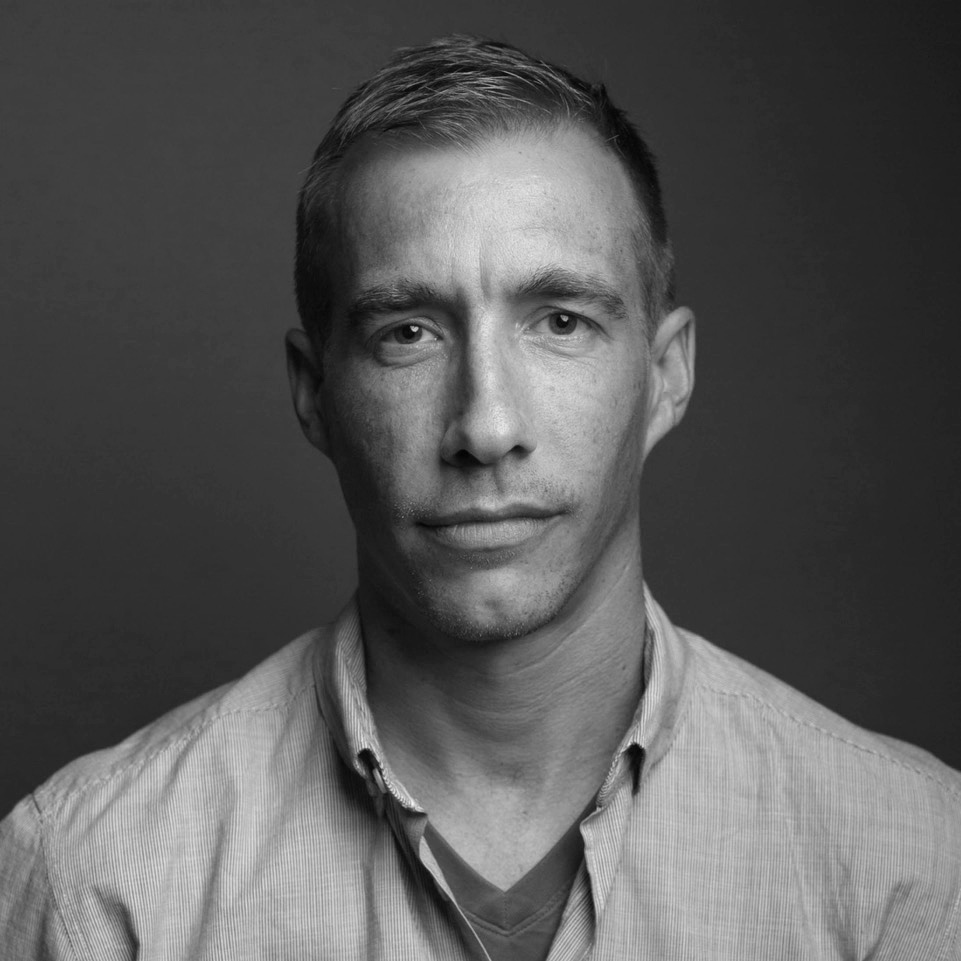Chris Sinclair is a Dallas-based doc filmmaker. Before starting his production company, Outskirt Films, he spent nearly a decade living and filming abroad for various news outlets and non-profits. He holds an M.A. in Visual Communication from Ohio University and resides in Dallas with his wife and son.
AHD: What is your favorite restaurant in Dallas?
If you want to visit Spain on a budget, go to Cafe Madrid. Best tapas in town—and affordable.
AHD: Favorite place to hash out your ideas, storyboard, or just send emails?
Communion Cooperative is my current co-working space of choice. They have an excellent restaurant attached and host a lot of great events for connecting with others.
AHD: What great films have you seen recently?
Some compelling doc films I’ve seen lately: Heroin(e), We Became Fragments (NYT Op-Doc), and my favorite docs from the Dallas International Film Festival this year: On Her Shoulders, and Won’t You Be My Neighbor.
AHD: What are your day to day responsibilities as Director of Outskirt Films?
It’s a mix for sure, but I love every aspect of it: generating new project opportunities and building relationships; pre-production client calls and emails to prep for upcoming shoots; of course everything related to filming; and then managing editing, post-production, and delivery. It sounds like a lot to shoulder, but there’s a strong community of collaborators in Dallas that have really helped to open doors, bring ideas and vision, and help execute each project. Like most things, collaboration is key.
AHD: Outskirt Films is a documentary focused film company. Why are you drawn to the documentary format and what do you think audiences get from a documentary that they don’t get from other types of films?
I started as a photojournalist. So documentary filmmaking was a natural progression. I’ve often thought about moving into scripted narrative work, but trust the right opportunity will present itself at the right time. I don’t consider myself a writer. But when I have a lot of material to work with, I love to distill it down into a story that replicates my experiences with subjects. In that sense, each documentary project is an exploration.
I think that’s also part of the answer to what audiences get from documentaries as opposed to other formats. Why reinvent the character wheel when there are so many real characters already out there to draw from? I think the tide has turned for documentaries. What once was a genre defined as dry, historical mini-series on PBS, documentary film as a craft has now become so rich and diverse. The tools to create are extremely affordable, and the outlets to share and engage are virtually endless. The only thing you really need is a good producer who can crack the whip and help you get projects done, on time and on budget.
AHD: You often work with nonprofits, advocacy groups, and social-driven organizations what is it about this type of work that motivates you?
Part of the answer is my background and network when I moved into filmmaking. I knew a lot of people in the non-profit space from my time living and working internationally.
Nonprofits by tax definition aren’t in it for the money. Their most valuable assets are people. By the nature of their socially-driven work, they are replete with hero’s journeys—stories of character transformation. Getting to know those people and experience a slice of their world for a few days, and then craft that experience into a film for others, is probably what motivates me the most.
AHD: You speak Thai and Chinese. How has your connection to Thailand and China impacted the films you have made?
Probably the single largest takeaway has been living and experiencing what it’s like to be a minority, to be ‘the other.’ When learning language by immersion, by necessity you become a full-time listener and observer, a student of nuance and gesture, and are often forced to reconcile bad assumptions and preconceived notions. And when you do try and speak, you’re misunderstood a lot! It’s humbling. But, as time goes by, friendships form out of all that. My time abroad has no doubt rolled over into the stories and characters that interest me, and how I try to craft stories.
Southeast Asia as a region is rich in cultural diversity and expression. Where there’s a lot of concentrated cultural diversity, tensions between groups of people often ensue, particularly when political lines cross-cultural ones. That’s part of what led me to explore stories related to the region’s conflicts and social injustices.
AHD: You make films both locally and globally. What local stories have inspired you recently?
I recently filmed for a client at Cafe Momentum. Their story of mentoring youth out of the justice system and into society was amazing to watch. I’ve volunteered at Bonton Farms in South Dallas, but I didn’t know the full backstory of Daron Babcock and others until I randomly saw the feature article D Magazine put out this past February. And I’m not just saying this, but all of my client work is truly inspiring! I learn so much about different people and topics on each job.
AHD: What projects are you working on now?
Right now I’m working on a variety of short doc films for clients on topics ranging from adoption, youth mentorship, executive coaching, and the arts. Beyond client work, my current passion project is a feature-length documentary currently titled Free Burma Rangers. With my friends at Deidox Films, we’re aiming to tell a larger story of the organization by the same name, the Free Burma Rangers. The film centers on a former Special Forces soldier and his family, how the organization formed, and what they’ve experienced over the past 20 years of traveling to war zones around the world assisting those caught on the front lines of conflict.
AHD: How did you get connected with Dave Eubank and the Free Burma Rangers project?
I originally met Dave Eubank via email as I was researching displaced people in Burma in 2004. He invited me on a relief mission, and I joined them as they treated people medically and documented atrocities behind enemy lines. Fast-forward to 2012, I focused on FBR for my Master’s thesis project. The result was a 20-minute doc film entitled A Front-Line Education. During the filming of that project, Eubank and I began the conversation about how best to tell the larger story. The following year in 2013, I began filming for the feature documentary.
AHD: What do you need to complete Free Burma Rangers and how can people get involved?
Our current need is primarily the finishing funds. Our budget, vision, and timeline are all outlined on the film’s website. We began a crowdfunding campaign a few weeks ago, and are excited to say that over 200 people have backed us! We’re definitely not there yet, but it’s been so encouraging to see the response and widespread desire to see this film finished.
AHD: After you finish Free Burma Rangers what’s next for you?
I’d love to tackle a local story that doesn’t span the globe and four different languages. I think it would come together a lot faster.
AHD: How as community played a role in your work and journey as a filmmaker? Likewise, how has community shown up as a theme in the stories you have filmed both locally and internationally?
As it relates to filmmaking, it’s near logistically impossible to pull off without a community of collaborators. And it’s no fun! Various artistic mediums have aspects of isolation in the creative process, but the art is ultimately breathed into and consumed by those in your community. It’s an exchange. Community is not just where we form our vision and voice as artists, but is also the context where we practice and live it out as well. In one of his books, Donald Miller put it more succinctly when he said something to the effect of, "Don’t just tell a good story, live one too."
I remember doing a short film series on homelessness in Japan. I was surprised to see businessmen in suits lining up for food. Some whose families had disowned them because of the shame their loss of a job brought on the family. It was saddening to witness what happens when community is fragmented. Isolation sets in, often leading to despair. Gratefully, for many of those men and women, community was restored through the homeless ministry’s outreach.
The stories I’m drawn to the most are ultimately stories of human transformation. That transformation is always set against the backdrop of either the presence or absence of relationships and community.
AHD: What advice do you have for people who are interested in getting involved in documentary making?
One of my first mentors told me to start locally. So I worked as a staff photographer at a few newspapers. It turned out to be great advice. I learned the tools of the trade, how to get comfortable photographing strangers, how to craft cutlines, hit deadlines, and discover stories with fresh eyes. I’m still improving on that. But it was great advice. So I’d pass it along. Second would be, if you want to do this as a business, learn how to run a business :) That hasn’t come naturally to me. I’m grateful to a number of friends, clients, and collaborators who have helped me learn as I go. But in God’s grace, it’s been sustainable and rewarding. I count it a blessing to do work that I absolutely love.



